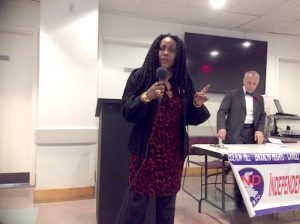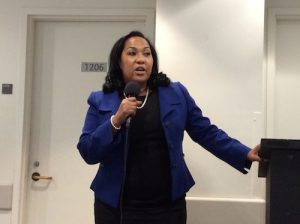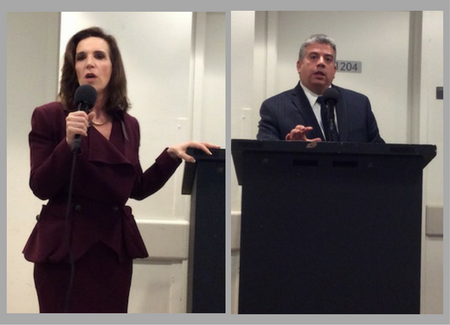The newly passed “Raise the Age” legislation may have been the coveted topic amongst the Brooklyn District Attorney candidates at last night’s Independent Neighborhood Democrats (IND) meeting, but it was the prosecution of marijuana that sparked debate between two candidates – acting DA Eric Gonzalez and Anne Swern.
Other candidates seeking to replace the late DA Ken Thompson, who attended the IND forum at St. Francis College in Downtown Brooklyn included Patricia Gatling and Ama Dwimoh.

“If I said I wasn’t going to prosecute marijuana cases, I wouldn’t have a 1,000 marijuana cases pending in my office,” said Swern, when asked which current policies she would change that Gonzalez currently implements. “So if I say I’m going to do some reforms, I’m going to do those reforms.”
Gonzalez responded to the allegations when he took the podium saying that in 2013 when Thompson took office there were over 13,000 marijuana cases and through his efforts as assistant district attorney under Thompson’s tutelage they decided not to prosecute low-level possession of marijuana — under 25 grams.
Gonzalez further stated that the decision not to prosecute low-level offenders stemmed from a racial component in which laws were being unevenly applied.

“But when it comes to smoking marijuana in our parks and around our children, I think that the police have to be able to take police action,” said Gonzalez. “Eighty-eight people pled guilty to some marijuana offense in 2016 versus the 13,000 we had in our system a few years ago.”
The discussion ironically took place only hours after marijuana-toting patrons took to Washington Square Park to celebrate National Weed Day a.k.a 4/20. Marijuana use for recreational purposes is now legal in eight states, and the use and distribution of medical marijuana is now legal in nearly half of the nation, including New York City.
While there may have been dissension over the prosecution of marijuana, all candidates praised the newly passed “Raise the Age” legislation.
On April 10, Gov. Andrew Cuomo signed legislation increasing the age of adult criminal responsibility from 16 to 18-years-old in New York. The law guarantees that New Yorkers under 18 who commit nonviolent crimes receive intervention and evidence-based treatment.
The legislation is accompanied by an implementation task force and will ensure no persons under 18-years-old will be held at Rikers Island when the act is slated to take effect on October 1, 2018. New York is second-to-last in the nation which charges 16 and 17-years-old as adults.
The “Raise the Age” legislation and the closing of Rikers will introduce a new set of dilemmas in which officials will have to address. Candidates proposed their take on minimizing crime and implementing alternative intervention programs in Brooklyn.
Swern, former managing counsel at Brooklyn Defender Services, spoke to the audience about her contributions to the Brooklyn DA’s office as a self-proclaimed expert in alternative sentencing. Alternatives such as drug treatment and mental health treatment are positions in which she aligns herself.
“There are many, many, many opportunities to exercise prosecutorial discretion with “Raise the Age” because many things have been left in the criminal court and many things have to go down to the family court with the discretion of the DA,” says Swern.
A DA who has vision, a DA who knows programming, a DA who can set up the adolescent court on October 1, 2018 when it first goes into effect for the 16-year-olds is the kind of DA that you want. I’m the best person to do that job and I commit to you to doing that,” added Swern.

Gatling, the former New York City’s Human Rights Commissioner, commended the “Raise the Age” legislation but reminded attendees that Brooklyn’s youth have to be safeguarded as well. “We have to make sure we protect our young people, because we know they can also be used [to perform criminal activity] because they are young and won’t be prosecuted as adults,” she said.
Gatling also expressed her support of the “double-blind” lineups and videotaped interrogation.
Dwimoh, most recognized for her work as an ADA in the Crimes Against Children Bureau, proposed a more preemptive attack on decriminalizing Brooklyn.

“I believe, as district attorney, it’s more than prosecution, it’s about prevention,” said Dwimoh. “It’s about understanding the needs of the people and what are the issues, what are the conditions that are out there and how they must be met. When children are safe, families are stronger, when families are stronger, communities strive.”
Gonzalez, spoke about a $1 million enhancement to his budget that will fund a Law Enforcement Assisted Diversion (LEAD) program in Brooklyn. The program is a pre-booking model that will minimize the prosecution of low-level drug offenders by sending them to drug treatment facilities rather than sending them to jail. Gonzalez has yet to officially announce his run for Brooklyn DA.










